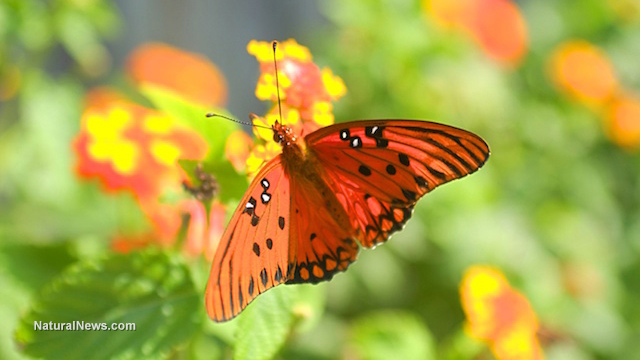Bee and butterfly populations are dwindling: crops, the economy, and the future of the world are beginning to feel the effects
Tuesday, March 15, 2016 by: L.J. Devon, Staff Writer
Tags: butterflies, pollinators, glyphosate weedkiller

(NaturalNews) In the quest for power and control, mankind has lost reverence for the biology and interconnected ecology that supports life on Earth. As mankind seeks dominion, he continues to separate himself from his natural surroundings, entering a state of disharmony that ultimately affects the natural systems in his body.
In agriculture, mankind has found ways to selectively engineer the genome of crops, taking out undesired traits to give crop produce a flawless appearance. How do these manipulations of crop DNA ultimately affect the human body?
Corporations continue to produce herbicides which are sprayed en masse to destroy the natural life science of plant growth. While the rest of the natural world feels the negative effects, corporations like Monsanto then profit from the poisons by genetically engineering their own seeds to withstand the chemical attacks they created (Roundup-Ready crops). Man-made, chemical science is replacing the natural science that has abounded and coexisted with humans since the beginning. What is mankind's new age synthetic pesticide science doing to the harmony in the human body?
Studies already show that herbicides like glyphosate are destroying the natural microbiology that connects man with his natural surroundings. Glyphosate kills off several species of good bacteria that live in the guts and intestines of humans. These bacteria intelligently communicate with the body, aiding in digestion, protecting the blood, and activating immune system responses.
Pesticides and herbicides are actually threatening the global economy
Studies show that pesticides and herbicides are also affecting the pollinators of the natural world, inhibiting their ability to fight off infectious mites and disease.The more that mankind tries to control agriculture with chemicals and manipulations of DNA, the more he inadvertently hurts the pollinators – predominantly the bees and the butterflies. The corporations that are supposedly building the economy are actually destroying both the economy and the natural world. As the ill effects of pesticides take hold, pollinator populations dwindle, ultimately affecting the reproductive ability of important vegetable and herb crops.
A 2016 assessment from the Intergovernmental Science-Policy Platform on Biodiversity and Ecosystem Services (IPBES), asserts, "Many wild bees and butterflies have been declining in abundance, occurrence and diversity at local and regional scales in Northwest Europe and North America." The more than 80 scientists conclude that pesticides are among the many man-made problems causing the mass pollinator die-offs. Mass-produced pesticides are spurring the evolution of invasive species and pathogens. Herbicides also contribute to habitat loss.
Up to 8 percent of world agricultural production is due to natural pollinators
Without pollinators, fruit and vegetable crops suffer. Between 5 and 8 percent of global agricultural production is because of the natural pollinators. Bees and butterflies stabilize the entire agricultural system, contributing an estimated 235 to 577 billion dollars to the economy of world agriculture.The IPBES report reminds that, "Pollinator-dependent species encompass many fruit, vegetable, seed, nut and oil crops, which supply major proportions of micronutrients, vitamins, and minerals in the human diet."
Through four years of study, the IPBES found that 16 percent of bat and bird pollinators around the world are being threatened to the point of extinction. In Europe, 37 percent of bee species and 31 percent of butterfly species are declining. In some places there, 40 percent of bee species are threatened.
Ultimately, dwindling numbers of pollinators leads to lower crop yields, which leads to rising prices for some of the healthiest fruit and vegetable crops. The crops most at risk include apples, mangoes and chocolate.
"Pretty much nearly all your fruits and many of your vegetables are pollination-dependent," said Simon Potts, deputy director of the Centre for Agri-Environmental Research at Britain's Reading University.
The high yields and natural quality of more than three quarters of the "leading types of global food crops," rely extensively on natural pollination. Strangely, this natural science of pollination is being threatened by mankind's chemical science. Is it time to re-evaluate what science really is? How can we educate ourselves going forward to preserve the natural science that connects all living systems?
The IPBES is calling for alternatives to pesticides and the diversification of agriculture to sustain nature's pollinators and the future survival of the human race.
Sources include:
TheGuardian.com
MDPI.com
Science.NaturalNews.com
Butterflies at FETCH.news
Get independent news alerts on natural cures, food lab tests, cannabis medicine, science, robotics, drones, privacy and more.
Take Action: Support Natural News by linking to this article from your website
Permalink to this article:
Embed article link: (copy HTML code below):
Reprinting this article:
Non-commercial use OK, cite NaturalNews.com with clickable link.
Follow Natural News on Facebook, Twitter, Google Plus, and Pinterest
- Fauci is back in the limelight, and he’s busy promoting a future COVID or FLU pandemic
- Tulsi Gabbard leads charge against the Biden regime’s global censorship of the 'Disinformation Dozen'
- Aerosolized bioweapons? Strange “diploid biomasses” falling out of the sky in Florida captured under the microscope
- How Israeli military-connected corporations are secretly controlling your online privacy
- DEADLY FLU JAB WARNING: New flu vaccines make recipients 27 PERCENT MORE LIKELY to catch the flu
- New study links mRNA vaccines to GENETIC CHANGES - and not the good kind
- Idaho Gov. Brad Little signs Medical Freedom Act banning vaccine mandates
- Kiss Your Genetic Privacy Good-Bye! 23andMe Gets Green Light to Sell Your Intimate Genetic Details to Anyone They Want
- Analysis: The coming economic collapse, a mass uprising and Trump's three secret weapons to halt the growing revolt
- U.S. lawmakers investigate Meta over alleged China collaboration
- Tulsi Gabbard takes aim at censorship: Justice for the ‘Disinformation Dozen’
- Widespread social and economic unrest: Steve Quayle issues urgent financial warning of imminent asset collapse in new interview with Mike Adams
- Curcumin’s ancient healing power supercharges muscle recovery, and its effects are compounded with anti-inflammatory foods and supplements
- DEATH BY DOCTOR: Why and how doctors are now PAID TO KILL their patients
- Mike Adams releases country western hit single: Goin’ Back in Time is Comin’ Home
- Trump’s EPA reviews fluoride safety amid growing concerns over risks to children’s health
- A comprehensive guide to DANDELIONS, an ancient herbal medicine and superfood
- China’s counter-tariff strategies: A new chapter in the U.S.-China trade war
- Aerosolized bioweapons? Strange “diploid biomasses” falling out of the sky in Florida captured under the microscope
- Analysis: The coming economic collapse, a mass uprising and Trump's three secret weapons to halt the growing revolt
- Kiss Your Genetic Privacy Good-Bye! 23andMe Gets Green Light to Sell Your Intimate Genetic Details to Anyone They Want
- Widespread social and economic unrest: Steve Quayle issues urgent financial warning of imminent asset collapse in new interview with Mike Adams
- Defunding DEADLY mRNA jabs: Government funding for mRNA technology being scrutinized and sidelined until proven "safe and effective" for real
- CLOT SHOT PLANDEMIC UNFOLDING: Fibrous, rubbery clots caused by covid injections have prion-like seeding activity
- European Court of Justice: Healthcare professionals who promoted or administered COVID-19 vaccines are CRIMINALLY LIABLE for any harm caused
- Mike Adams releases country western hit single: Goin’ Back in Time is Comin’ Home
- DEATH by VACCINE or face PRISON time: Canadian Freedom Convoy leaders CONVICTED for protesting forced vaccination during the Covid Plandemic
- Newly released JFK files reveal Pentagon's role in creating Lyme disease and covid in the same lab
- “Project Aldrin”: Senate probes Meta's alleged censorship dealings with China
- How Israeli military-connected corporations are secretly controlling your online privacy
- The hidden war above: Chemtrails, HAARP and the battle for planetary control
- Federal employees whine over DOGE's new directive requiring them to do a 5-point summary of weekly accomplishments
- FBI imposed gag order on agents to silence Hunter Biden laptop truth before 2020 election, new chat logs reveal
- Tulsi Gabbard leads charge against the Biden regime’s global censorship of the 'Disinformation Dozen'
- U.S. approves new Russian ambassador as diplomatic thaw continues
- I Want My Bailout Money – new song released by Mike Adams
- Newly released JFK files reveal Pentagon's role in creating Lyme disease and covid in the same lab
- Mike Adams releases country western hit single: Goin’ Back in Time is Comin’ Home
- Dr. Mike Yeadon releases 15-minute testimony - WATCH - about genocidal intent of COVID “vaccines”
- The Health Ranger releases “Vaccine Zombie” song and music video, using AI-animated zombies for the music video
- California's social media censorship law struck down: A victory for free speech or a threat to online safety?
- EPA advisor admits the agency is funneling billions to climate groups ahead of Trump’s return to White House
- Rep. Nancy Mace introduces bill to ban biological males from female facilities on federal property
- OpenAI whistleblower who dissented against how the company trained ChatGPT found dead
- Survival 101: Effective EMF blocking techniques
- Analysis: The coming economic collapse, a mass uprising and Trump's three secret weapons to halt the growing revolt
- MEDICAL BOMBSHELL: FDA admits Covid mRNA 'Vaccines' CAUSE CANCER
- CONSERVATIVES SOUND THE ALARM: Big Pharma and the Left trying to force $32 billion money grab from America’s seniors into year-end spending deal
- Florida takes a stand: DeSantis proposes permanent ban on mRNA vaccine mandates
- Sugarcane extract superior to cholesterol-lowering drugs?
- Pilots report mysterious lights 'moving at extreme speeds' across Oregon skies
- Trump reverses course on Gaza plan, says “nobody is expelling Palestinians”
- 5 Simple steps to boost your brainpower: How to strengthen executive function in a distracted world
- Trump Administration cuts 2,000 USAID jobs, places most employees on leave in sweeping reform effort
- Red Cross issues warning to stop blood plasma donations from vaccinated people
- Scientists confirm: GENIUS brain function can be spontaneously unleashed in humans without any apparent cause
- EPA advisor admits the agency is funneling billions to climate groups ahead of Trump’s return to White House
- HYSSOP: What research reveals about the health benefits of this ancient holy herb
- Two containers with completed ballots fall out of truck in Florida
- Fully vaccinated about to see “tsunami” of illness and death, warns virologist
- Global leaders unite to clamp down on “misinformation” with UN-backed Cascais Declaration
- Newly released JFK files reveal Pentagon's role in creating Lyme disease and covid in the same lab
- BREAKING: 2025 NDAA authorizes mandatory military draft of WOMEN across America… as Pentagon pursues global NUCLEAR war with both Russia and China at the same time
- Michael Yon warns of a ZIONIST TAKEOVER in Trump’s second administration
- Ozempic and Wegovy weight loss drugs are injectable LIZARD VENOM PEPTIDES that may unleash a devastating wave of organ failure… side effects align with symptoms of SNAKE BITES
- The Health Ranger releases “Vaccine Zombie” song and music video, using AI-animated zombies for the music video
- BOMBSHELL: DNA testing kits are a SCAM to develop ethnic-specific bioweapons
- Israeli soldiers accused of even more torture and abuse in the West Bank
- These 13 countries just signed an agreement to engineer a global FAMINE by destroying food supply
- NASA admits that climate change occurs because of changes in Earth’s solar orbit, and NOT because of SUVs and fossil fuels
- RFK Jr. clears key hurdle: Sen. Susan Collins backs controversial HHS nominee, signaling a new era for health policy
- Sermon 30: How Jesus reveals Caesar’s FAKE CURRENCY and FALSE AUTHORITY
Science News & Studies
Medicine News and Information
Food News & Studies
Health News & Studies
Herbs News & Information
Pollution News & Studies
Cancer News & Studies
Climate News & Studies
Survival News & Information
Gear News & Information
News covering technology, stocks, hackers, and more



"Big Tech and mainstream media are constantly trying to silence the independent voices that dare to bring you the truth about toxic food ingredients, dangerous medications and the failed, fraudulent science of the profit-driven medical establishment.
Email is one of the best ways to make sure you stay informed, without the censorship of the tech giants (Google, Apple, Facebook, Twitter, YouTube, etc.). Stay informed and you'll even likely learn information that may help save your own life."
–The Health Ranger, Mike Adams












































